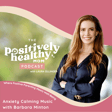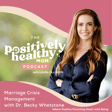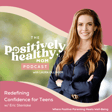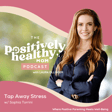
Navigating College Admissions | The Positively Healthy Mom Podcast with Jenna Schebell
Navigating College Admissions | The Positively Healthy Mom Podcast
Welcome back, Positively Healthy Moms! In this episode, host Laura Ollinger sits down with Jenna Schebell, founder of The College Navigators, to demystify today’s college-admissions landscape and equip families with the clarity and confidence they need.
What you’ll learn
- How to stop overwhelm by focusing on what you can control in the application process
- Why colleges care more about context than raw GPA or test scores
- Depth over breadth: building a meaningful activities list that truly stands out
- The real purpose of the personal essay and how to keep it authentic
- Understanding institutional priorities, enrollment trends, and why acceptance rates keep shifting
- Practical tips for crafting a balanced college list that fits academic, financial, and personal goals
- When working with a college consultant makes sense—and plenty of free resources if it doesn’t
Key moments
00:02 Introduction and Jenna’s dual perspective (admissions + high-school counseling)
08:45 GPA vs. SAT and why context matters
14:30 Building a list you’ll love—even if every “reach” says no
22:05 Post-COVID shifts: why Southern and SEC schools exploded in popularity
29:50 “Big fish, small pond?” How campus culture shapes success
36:40 Writing essays that sound like you (and no one else)
45:55 Services Jenna offers: 1-on-1 advising, group coaching, and application reviews
52:10 Final takeaways for parents and teens
Connect with Jenna Schebell
Instagram: @thecollegenavigators
Free guides and timelines: https://thecollegenavigators.com
Connect with Laura Ollinger
Instagram: @positivelyhealthycoach
Podcast archives and coaching programs: https://positivelyhealthycoaching.com
Enjoyed the episode?
✅ Hit LIKE and SUBSCRIBE for more nourishing conversations
✅ Share this video with a friend who’s facing the admissions maze
✅ Leave a comment: What part of the college process feels most confusing right now?
Your support helps us bring empowering content to families everywhere—one confident student at a time.



















